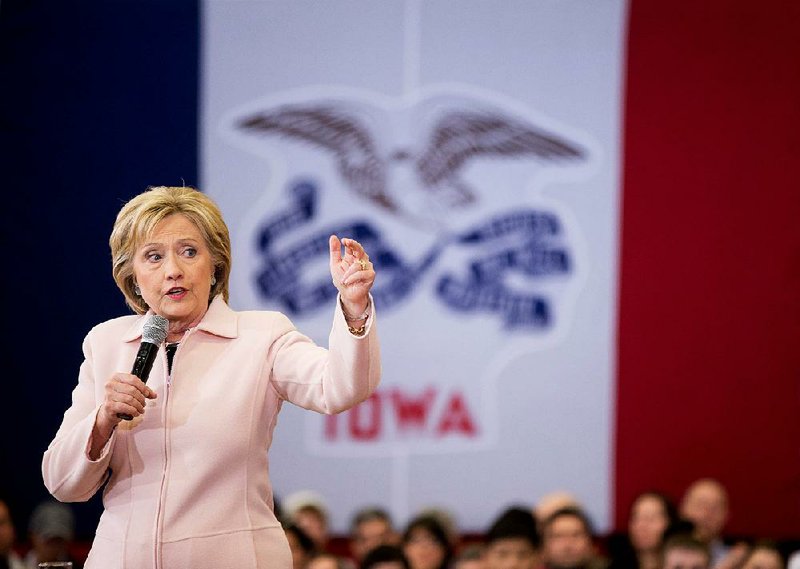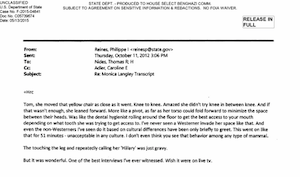WASHINGTON -- President Barack Obama's administration confirmed for the first time Friday that Hillary Clinton's home server contained closely guarded government secrets, censoring 22 emails that contained material requiring one of the highest levels of classification.
RELATED ARTICLES
http://www.arkansas…">GOP chief: Trump to set record http://www.arkansas…">O'Malley as spoiler a possibility http://www.arkansas…">Caucuses Monday, hopefuls add heat, go on the defensive
State Department officials also said the agency's Diplomatic Security and Intelligence and Research bureaus are investigating whether any of the information was classified at the time of transmission, going to the heart of Clinton's defense of her email practices.
The department published on Friday evening its latest batch of emails, about 1,000 pages, from Clinton's time as secretary of state.
But seven email chains, totaling the 22 emails, were withheld in full for containing "top secret" information. The 37 pages include messages a key intelligence official recently said concerned "special access programs" -- highly restricted, classified material that could point to confidential sources or clandestine programs like drone strikes.
"The documents are being upgraded at the request of the intelligence community because they contain a category of top secret information," State Department spokesman John Kirby said, calling the withholding of documents in full "not unusual." That means they won't be published online with other emails, even with blacked-out boxes.
Kirby said the State Department has not yet made a determination of whether the information was classified at the time it was sent or has become more sensitive because of subsequent events. He said that, regardless, the information was deemed too sensitive Friday for release.
Department officials wouldn't describe the substance of the emails or say whether Clinton sent any herself.
The revelation comes three days before Clinton, a Democratic presidential candidate, competes in the Iowa presidential caucuses.
Republican presidential candidates have been excoriating Clinton over the emails, arguing that she broke the law. Sen. Marco Rubio of Florida said at a debate of the party's candidates Thursday that if Clinton is elected, "one of her first acts as president may very well be to pardon herself."
"We need a President who can be trusted to keep our secrets secret," Jeb Bush, the former Florida governor, wrote Friday on Twitter. "Obviously that's not @HillaryClinton."
Clinton's rival for the Democratic nomination, Sen. Bernie Sanders of Vermont, declined to comment on Friday's developments.
'overclassification' claimed
Clinton insists she never sent or received information on her personal email account that was classified at the time. No emails released so far were marked classified, but reviewers previously designated more than 1,000 messages at lower classification levels. Friday's will be the first at top-secret level.
Even if Clinton didn't write or forward the messages, she still would have been required to report any classification slippages she recognized in emails she received. But without classification markings, that may have been difficult, especially if the information was publicly available.
"We firmly oppose the complete blocking of the release of these emails," Clinton campaign spokesman Brian Fallon said. "Since first providing her emails to the State Department more than one year ago, Hillary Clinton has urged that they be made available to the public. We feel no differently today."
"After a process that has been dominated by bureaucratic infighting that has too often played out in public view, the loudest and leakiest participants in this interagency dispute have now prevailed in blocking any release of these e-mails," Fallon said in a statement.
The documents, he said, originated in the State Department's unclassified system before they ever reached Clinton, and "in at least one case, the emails appear to involve information from a published news article."
"This appears to be overclassification run amok," Fallon said.
Kirby said the State Department was focused, as part of a Freedom of Information Act review of Clinton's emails, on "whether they need to be classified today." Past classification questions, he said, "are being, and will be, handled separately by the State Department." It is the first indication of such an investigation.
Department responses for classification infractions could include counseling, warnings or other action, officials said. They wouldn't say whether Clinton or her senior aides could face penalties. The officials weren't authorized to speak on the matter and demanded anonymity.
Separately, Kirby said the department withheld eight email chains, totaling 18 messages, between Obama and Clinton. These are remaining confidential "to protect the president's ability to receive unvarnished advice and counsel," and will be released eventually, like other presidential records.
The emails have been a Clinton campaign issue since 10 months ago, when The Associated Press discovered her exclusive use while in office of an email server in the basement of her family's New York home. Doing so wasn't expressly forbidden. Clinton first called the decision a matter of convenience, then a mistake.
In March, Clinton and the State Department said no business conducted in the emails included top-secret matters. Both said her account was never hacked or compromised, which security experts assess as unlikely.
Clinton and the State Department also claimed that the vast majority of her emails were preserved properly for archiving because she corresponded mainly with government accounts. They've backtracked from that claim in recent months.
The emails on special access programs surfaced last week, when Charles McCullough, lead auditor for U.S. intelligence agencies, told Congress that he found some in Clinton's account.
Kirby confirmed that the "denied-in-full emails" are among those McCullough cited. He said one was among those McCullough identified last summer as possibly containing top-secret information.
The Associated Press reported in August that one focused on a forwarded news article about the CIA's classified U.S. drone program. Such operations are widely discussed publicly, including by top U.S. officials, and State Department officials debated McCullough's claim. The other concerned North Korean nuclear weapons programs, according to officials.
At the time, several officials from different agencies suggested the disagreement over the drone emails reflected a tendency to overclassify material and a lack of consistent classification policies across government.
charges seen unlikely
The FBI also is looking into Clinton's email setup but has said nothing about the nature of its investigation. Independent experts say it's unlikely Clinton will be charged with wrongdoing, based on details that have surfaced so far and the lack of indications that she intended to break laws.
"What I would hope comes out of all of this is a bit of humility" and Clinton's acknowledgment that "I made some serious mistakes," said Bradley Moss, a Washington lawyer specializing in security clearances.
If investigators determine that Clinton's emails contain classified information, she could be charged with a felony, said Steven Levin, a defense lawyer and former federal prosecutor who has represented those accused of mishandling classified material.
However, Levin said, the bar to filing such charges is high: Federal prosecutors would have to prove that Clinton knew she was discussing classified information, even if it wasn't marked as classified at the time. "It's not enough to prove she was negligent," Levin said. "You have to prove she knew it was classified and was reckless in how she handled it. They have to prove knowledge. That is a high bar."
A key element is determining when the information was classified, Levin said. If Clinton was discussing information that was later classified, she didn't break the law, he said.
"Timing is everything," he said. "If it wasn't classified at the time, she can't be charged. If it was classified at the time, then the question is whether she knew it was."
If Clinton knew the information should have been classified but it hadn't yet been deemed to be a government secret, she also can't be prosecuted, Levin said.
The State Department has been under a court order to release the documents in batches, once a month, as part of a lawsuit filed by reporter Jason Leopold of Vice News, who sued after the department failed to promptly respond to his request for the public documents. The department has so far released approximately 42,000 pages of Clinton's correspondence.
While a judge had ordered the department to release all of the emails by the end of January, lawyers for the department said this week that they would miss the deadline and requested another month. That would mean the last of the emails would not be released until the end of February--after the Iowa caucus and the New Hampshire primary, officials there told a federal judge this week.
The lawyers said there are 9,000 more pages left to review and release. But they indicated that 7,000 of those pages required review by other government departments before they could be made public, so as to allow other agencies the opportunity to flag material they considered classified. The lawyers indicated that the department discovered several weeks ago that the documents still needed review and had not yet been distributed, a process that was further slowed by the recent blizzard that shut down the government for days.
Information for this article was contributed by Bradley Klapper of The Associated Press; by Ben Brody and Del Quentin Wilber of Bloomberg News; and by Rosalind S. Helderman and Carol Morello of The Washington Post.
A Section on 01/30/2016


